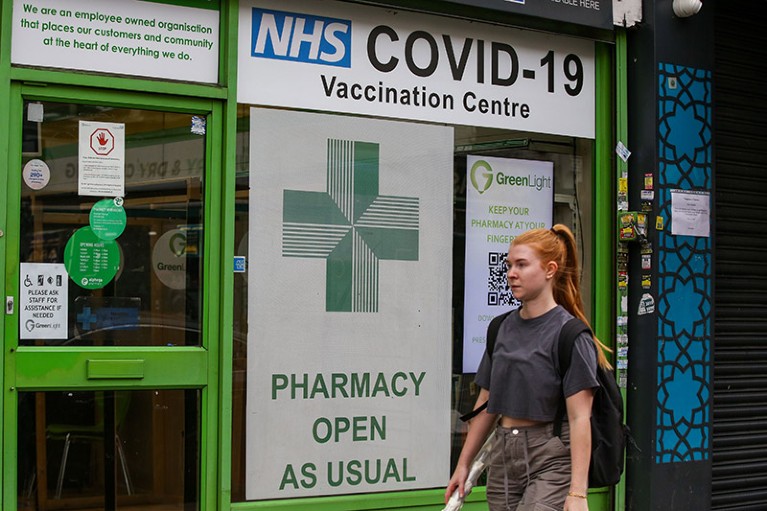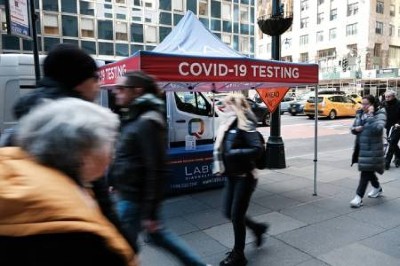COVID boosters are back: what scientists say about whether to get one
https://www.nature.com/articles/d41586-023-02840-x?utm_source=Nature+Briefing&utm_campaign=ed0de3db55-briefing-dy-20230913&utm_medium=email&utm_term=0_c9dfd39373-ed0de3db55-42153039
As many countries head into autumn, they are targeting vaccinations at people in high-risk categories, leaving those at lower risk uncertain about what to do.

Health officials moved forward the start of an autumn COVID-19 booster campaign in England from early October to 11 September.Credit: Dinendra Haria/LNP/Shutterstock
Across the Northern Hemisphere, public-health officials are rushing to roll out autumn COVID-19 vaccination campaigns to guard against a fresh batch of SARS-CoV-2 variants. In England, officials brought forward the start date for administering an updated booster to Monday — roughly a month earlier than planned. On Tuesday, the US Centers for Disease Control and Prevention (CDC) recommended newly formulated boosters to all people above the age of six months.
But many nations are recommending the top-up jabs only for those at elevated risk of hospitalization or death, such as those aged 60 and above. Where does that leave the millions of people not in those high-risk groups?
Scientists say that younger people who are healthy and already vaccinated will still have some protection against severe disease if they sit out this round of jabs. But researchers also say that even for individuals not in high-risk groups, a booster would reduce the risk of a new SARS-CoV-2 infection — albeit fleetingly — and offer other advantages, too.
“Anyone who takes it will benefit,” says immunologist Rafi Ahmed at Emory University in Atlanta, Georgia.
Booster bonanza
Some nations have offered booster doses multiple times since 2021. The United States, for example, has rolled out boosters at least twice for people at low risk and four times for those in high-risk groups.
But the booster calculus has changed, because so many people have now been exposed to SARS-CoV-2 in one way or another. In England, for example, more than three-quarters of the population had been vaccinated or infected by mid-February. In Beijing, more than 90% of people had been infected by the end of January1.
Now, many countries no longer have a boosters-for-all policy (see ‘Another autumn, another COVID booster’). The United Kingdom announced in August that autumn boosters would be offered only to the most-vulnerable individuals, such as adults aged 65 and older and health-care workers. France does not recommend an autumn booster for people not in vulnerable groups. Germany is not mounting a booster campaign at all, although it does advise an annual booster for people in high-risk groups.
Among the outliers is the United States. On Tuesday, independent scientists who advise the CDC voted 13 to one to recommend universal access to the updated vaccine.
Benefits from the updated booster “are anticipated in all age groups”, CDC epidemiologist Megan Wallace, based in Atlanta, told the CDC advisers before the vote. Models predict that more hospitalizations and deaths are avoided when universal access is provided than when boosters are recommended only to people aged 65 years and older, she said.
Another autumn, another COVID booster
Many nations in the Northern Hemisphere plan to administer COVID-19 boosters in the coming months — but most are recommending the jabs for only a limited pool of people.
|
Country
|
Autumn campaign planned?
|
Details
|
|
China
|
Yes
|
Campaign will target people aged 60 and above and individuals aged 18–59 in high-risk groups, such as those with certain underlying conditions or weakened immune systems.
|
|
France
|
Yes
|
Boosters are ‘strongly recommended’ for groups including people aged 65 and older, those aged 6 months and up with certain health conditions and close contacts of vulnerable people.
|
|
Germany
|
No
|
Germany is not running an autumn booster campaign, but does recommend that people in high-risk groups receive an annual booster.
|
|
England
|
Yes
|
People in high-risk groups will be invited for boosters, including health-care workers and those in care homes or aged 65 and older.
|
|
Mexico
|
Yes
|
Boosters will be given to those in high-risk groups, including people aged 60 and older and those with pre-existing health conditions and weakened immune systems.
|
Sources: China; France; Germany; England; Mexico
Researchers generally agree that, because the booster’s main effect is preventing severe disease, individuals in high-risk groups are the ones who will benefit the most. “For the elderly, the immunosuppressed and people with comorbidities, it makes a lot of sense to get the booster, and they probably need more than one every year,” says immunologist Dan Barouch at Beth Israel Deaconess Medical Center in Boston, Massachusetts.
The shift away from universal access, however, leaves people not in vulnerable groups to decide for themselves — and scientists are divided on the best approach for those individuals.
To boost or not to boost
For people at low risk, the booster “is not necessarily protecting them against severe disease because they don’t have that risk to begin with”, says Amesh Adalja, an infectious-disease specialist at the Johns Hopkins Center for Health Security in Baltimore, Maryland.
But he and others say that boosters can delay SARS-CoV-2 infection for those at low risk of severe disease, although the vaccination won’t block infection indefinitely. Boosters can also shorten a bout of COVID-19, Ahmed says, which might lead to a reduction in viral transmission.

Why a highly mutated coronavirus variant has scientists on alert
Epidemiologist Michael Osterholm at the University of Minnesota in Minneapolis, says that individuals in low-risk categories should be able to choose to get a vaccine. He cites an increase in the number of COVID-19 hospitalizations in young US children, arguing that parents might be justified in wanting to vaccinate their child. But he also agrees that it’s okay for healthy individuals to skip this booster. Barouch says that “there is controversy” among specialists about whether young, low-risk people should get it.
Another complicating factor is the rise of new SARS-CoV-2 variants, including the highly mutated Omicron descendant BA.2.86. Its appearance prompted health officials in England to accelerate the rollout of autumn boosters, including an updated vaccine that targets an Omicron offshoot called XBB.1.5, which prevailed in many countries in the first half of 2022. The vaccines recommended in the United States also target this variant.
Reassuring results
Data suggest that, despite earlier worries about the vaccine’s efficacy, the updated booster will probably be effective against BA.2.86 and its competitor variants. Moderna announced last week that its COVID-19 vaccine targeting XBB.1.5 also generates antibodies against BA.2.86 and other variants that are in circulation. According to a preprint2 published on 4 September on bioRxiv, antibodies from people infected with SARS-CoV-2 when XBB.1.5 was in circulation are active against BA.2.86. The study has not yet been peer reviewed.
Barouch’s team has evaluated people who had been infected with the XBB variant and has found3 that their antibody responses to all the variants, including BA.2.86, increased after infection. “This suggests that the vaccine based on XBB.1.5 should be able to raise antibody responses against all circulating variants,” Barouch says. The work, published on 5 September on bioRxiv, has not yet been peer reviewed.
doi: https://doi.org/10.1038/d41586-023-02840-x
Additional reporting by Gemma Conroy and Lilly Tozer.
References
-
Leung, K., Lau, E. H. Y., Wong, C. K. H., Leung, G. M. & Wu, J. T. Nature Med. 29, 579–582 (2023).
Article PubMed Google Scholar
-
Sheward, D. J. et al. Preprint at bioRxiv https://doi.org/10.1101/2023.09.02.556033 (2023).
-
Lasrado, N. et al. Preprint at biorXiv https://doi.org/10.1101/2023.09.04.556272 (2023).
|
